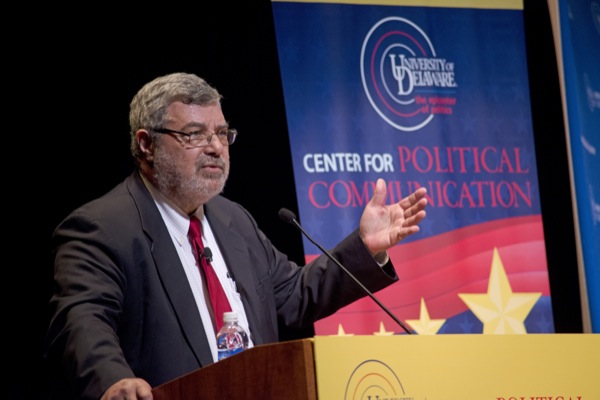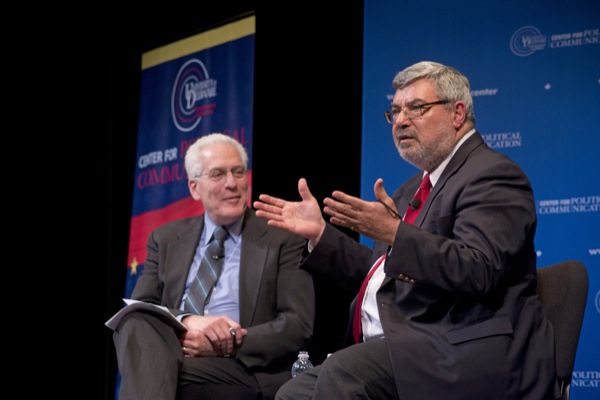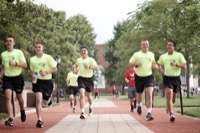Global Agenda
Obama to find a changed Middle East during visit, journalist says
3:52 p.m., March 14, 2013--When President Barack Obama embarks on a trip to the Middle East next week he will be going to a region much changed from that the United States has dealt with for the last two generations, journalist Rami Khouri told a University of Delaware Global Agenda audience Wednesday night in Mitchell Hall.
Khouri, an internationally syndicated political columnist and editor-at-large of Beirut’s Daily Star newspaper, discussed the role of the U.S. in the Middle East as part of the spring series focused on “America’s Role in the World.”
People Stories
'Resilience Engineering'
Reviresco June run
The effects of the two-year-old Arab Spring movement toward pluralistic democracy mark a “time of historical change,” Khouri said, one with certain dangers but also one with great opportunities.
Obama, he said, is traveling to a “new world,” one in which the U.S. needs to make a fundamental reassessment of a foreign policy that for years has supported autocrats, has been biased toward Israel, has supported the use of military force and, more recently, has approved of routine assassinations on foreign soil through the use of drones.
The Middle East looks to the U.S. as an example of the rule of law and would like to see its values expressed in its foreign policy stance in the region, he said.
America must now decide how to best engage with the current transformation, Khouri said, describing the process of “mass self-determination” as the most important change in the Middle East in decades.
The people of the Middle East, for the first time, have an opportunity to write their own constitutions, to shape their own societies, to tell the world who they are and what they believe, Khouri said.
“This is an extraordinary window,” he said, for the rhetoric and values of the U.S. and the Arab world to “come together in an historic synthesis.”
As do Americans, Khouri said the people of the Middle East value a society of free citizens equal under God and under law, and a political system in which the majority rules and the minority is protected.
“The challenge is to grasp how important, how fleeting this opportunity is,” he said, noting that history is littered with other missed opportunities.
Perceptions of the U.S.
Citing recent polls, Khouri said perceptions of the U.S. in the region are “extremely mixed” but generally low, with Libya an exception because America got things right in putting its military force to use in service of the pluralistic and democratic aspirations of the people of that nation.
Decreased respect for the U.S. has shown in its efforts over the last five years to deal with the region’s powers of Iran, Israel, Turkey and the Arab world, Khouri said, noting that none have responded to American pressure.
There are serious implications when the values the U.S. espouses are not reflected in its foreign policy, he said, adding that rhetoric must match actions.
On the other hand, Khouri said, the people of the Middle East must come to terms with the reality of Israel and the Israelis must do likewise with the Palestinians.
Issues at play
Complicating the situation is a tripling of the number of issues at play in the Middle East, which for years numbered just three – the Arab-Israeli conflict, the Cold War and energy.
Added to the Arab-Israeli conflict and energy, Khouri said, are Iran; the Arab Spring; the wars in Iraq and Afghanistan; emerging “actors” in the region, including China and a revived Russia; terrorism and weapons proliferation; the fragility of several nations, including Somalia and Yemen; an ideological war, as between Iranians and Arabs and Sunnis and Shiites; and the unpredictable forces of populism, including social media and mass street politics.
About Global Agenda
Global Agenda is sponsored by the Center for Political Communication and presented by the Institute for Global Studies, the Department of Communication and the Department of Political Science and International Relations.
The theme of this year’s Global Agenda is “America’s Role in the World.”
The series is moderated by Ralph Begleiter, director of UD’s Center for Political Communication.
The series is free and open to the public.
It will continue at 7:30 p.m., Wednesday, March 20, in Mitchell Hall, with a presentation on “The U.S. Role in Asia” by James Mann, author-in-residence at the Johns Hopkins School of Advanced International Studies.
Article by Neil Thomas
Photos by Duane Perry












